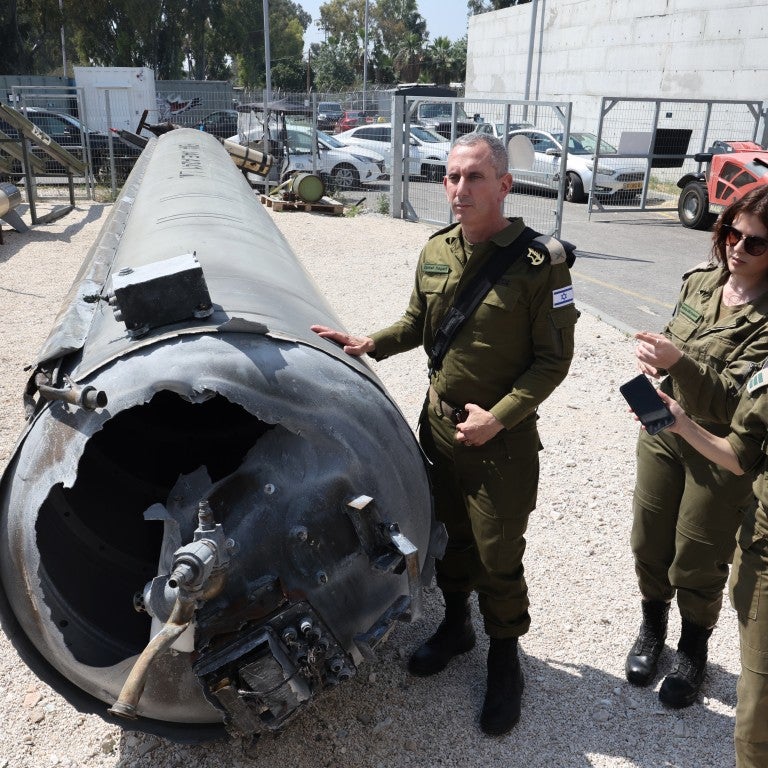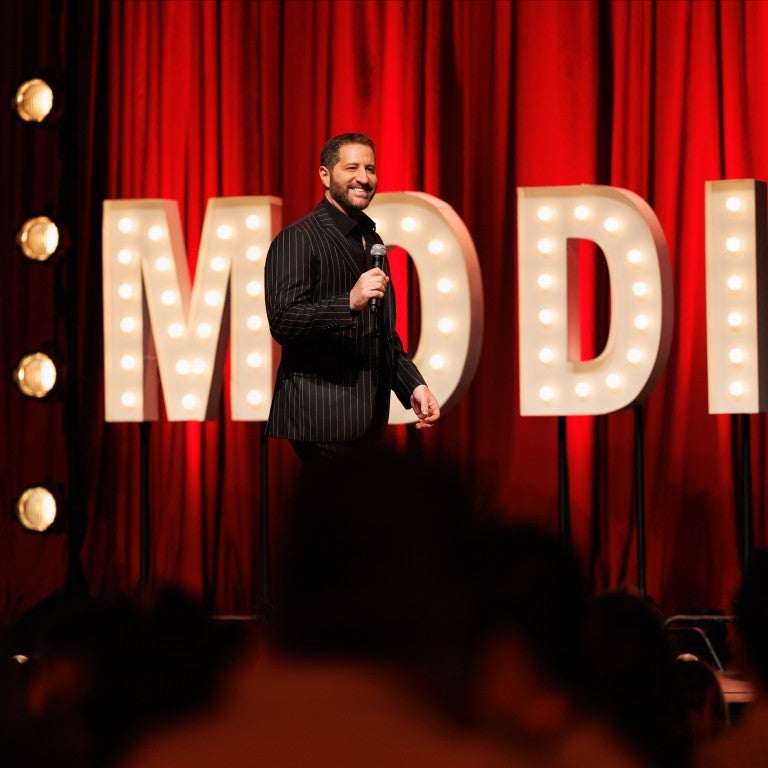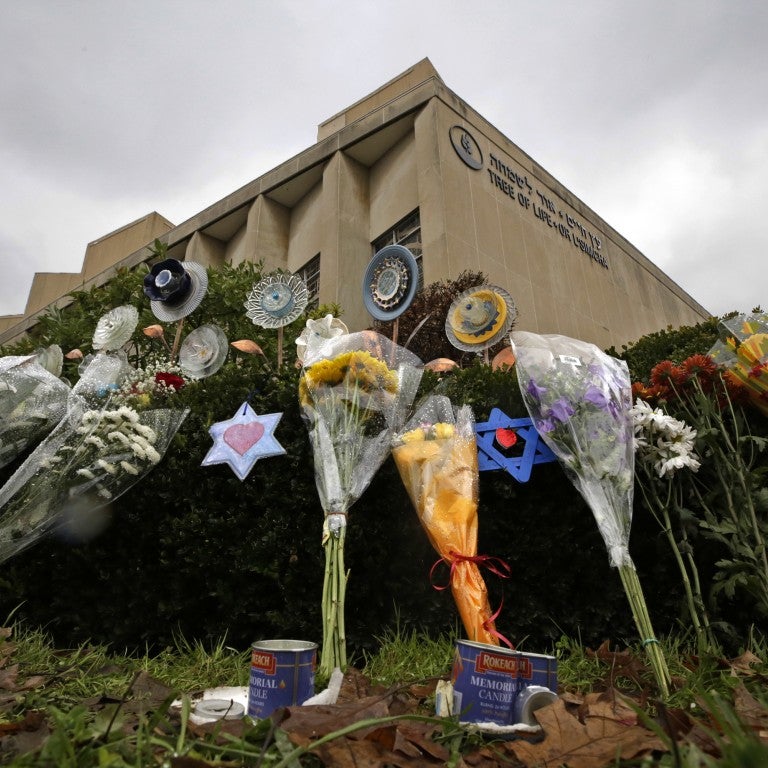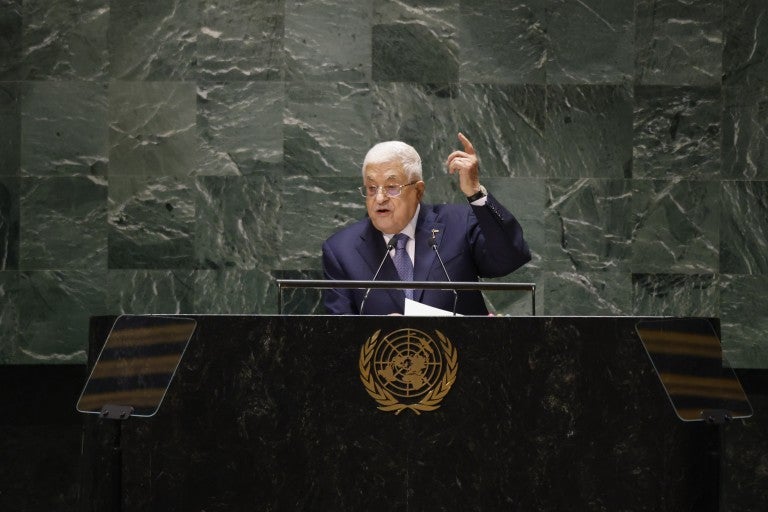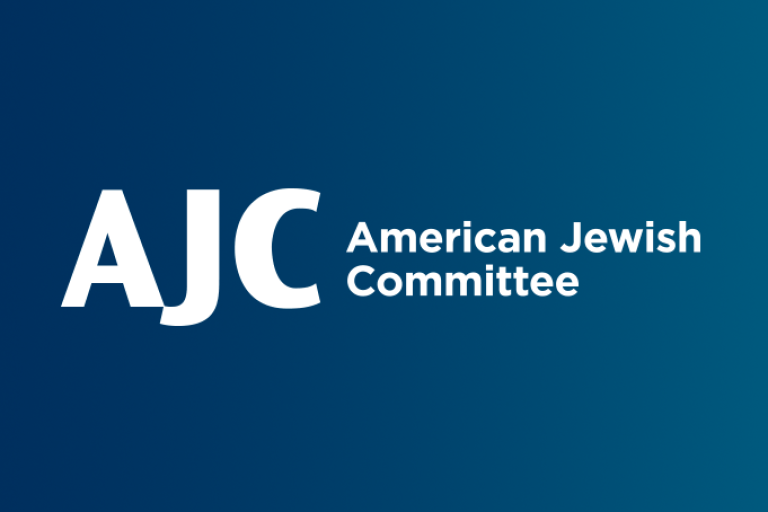January 19, 2023
Since its Broadway opening last fall, Tom Stoppard’s “Leopoldstadt,” a play about a multi-generational Jewish family in Vienna, based on Stoppard’s own family history, has been met with critical acclaim. Hear from celebrated actor David Krumholtz, who plays the patriarch of the family, on how his Jewish identity has been transformed by the role, why he speaks to his young children about antisemitism, and the importance of Holocaust education today.
*The views and opinions expressed by guests do not necessarily reflect the views or position of AJC.
Episode Lineup:
- (0:40) David Krumholtz
Show Notes:
Leopoldstadt: Tickets and more information
Photo credit: Joan Marcus
Listen to:
- Our most recent podcast episode: Shabbat Shalom No More? One Year Later, Colleyville Synagogue Wrestles with Impact of Hostage Crisis
Follow People of the Pod on your favorite podcast app, and learn more at AJC.org/PeopleofthePod
You can reach us at: peopleofthepod@ajc.org
If you’ve enjoyed this episode, please be sure to tell your friends, tag us on social media with #PeopleofthePod, and hop onto Apple Podcasts to rate us and write a review, to help more listeners find us.
Transcript of Interview with David Krumholtz:
Manya Brachear Pashman:
Since its official Broadway opening on October 2 2022, Tom Stoppard's latest play Leopoldstadt has received widespread acclaim. One of the hottest tickets in town, it has been extended through July 2023. The drama follows multiple generations of a Viennese Jewish family over half a century, beginning in 1899. Through the Holocaust and beyond, the fictional family and the story is based on Stoppard's own. When he was in his 50s, the playwright learned that he was Jewish and had lost his grandparents and many other family members in the Shoah. With us now to discuss his role in the play is actor David Krumholtz, who plays Hermann Merz, the tragic patriarch of this fictional family who has converted to Catholicism for purposes of social and professional mobility, but discovers in the end it is to no avail. David, welcome to People of the Pod.
David Krumholtz:
Thank you so much. Thanks for having me.
Manya Brachear Pashman:
So I described your character as tragic, but it is a play about the Holocaust. So would you say all of the characters in this play are tragic? Would you agree? Walk our audience through Hermann Merz’s approach to life, to his Judaism.
David Krumholtz:
I don't see the character as tragic at all, which is sort of a conversation I needed to have with Patrick Marber, our director before I even auditioned for the role. I think he's heroic in many ways. He's doing the very best he can for his family, and for the future generations of his family, and in doing so, he has had to shed his Judaism. You get the sense, though, that he was kind of raised in the religion of business. The most important thing he inherited, this textile factory from his father, and his father did very well. And it seems to me that he was groomed to take over and bring it to great success, build it farther than his father could have ever imagined. And for the sake of his family, and for the sake of future generations. So, certainly converting to Catholicism in late 19th century Austria, was one of the ways to do that, you know, he wasn't labeled anymore, it opened up channels that he probably would have had a harder time getting in on.
He did all that he possibly could do to benefit from the choice. And it's a choice, ultimately, that he must have known broke his mother's heart, and alienated him from his family, from the more religious members of his family. And yet, he did it anyway. And he does suffer for it. And it seems to me he's willing to suffer for it. But when we learn about him, is that at the very core of who he is, he is Jewish. At the first instance, of someone challenging his Judaism or, you know, mocking his Catholicism, he's ready to kill the guy, literally. So we get the sense that this is a very, very deep seated issue that comes from, as he explains through a story about his grandfather being bullied for being Jewish. It's true. There's a trauma there that he is doing this from, it's not all just business-minded and flippant. This is something that he has been tortured by his whole life by the time we meet him.
Which is why he has so many strong opinions on Israel and the future of Jews, and assimilation in Austria. Vienna, being at the time, the cultural center of the world with an emperor king who emancipated Jews from all wrongdoing. And was a sort of Jewish sympathizer who gave Jews quite a lot of leeway that they didn't have prior to his reign. So things are looking up when we meet Hermann Merz, looking up not only for his business and his family, but for Jews in Vienna.
I think he has every right to feel positively about the future, think positively about the future, and not want to move his entire family to the middle of the desert. He's righteous in that indignation. And sadly, time tells a different story. The next, you know, 40 years of his life, teach him that his ideals and his hopes for the future were obsolete or were futile. And that's the tragedy of the story of Hermann Merz. But I don't view him as a tragic figure.
Manya Brachear Pashman:
But what you're referring to is there's a kind of an ongoing debate through the play between Ludvig, his brother in law, if I'm not mistaken, and Hermann, and that debate is about assimilation and what the definition of assimilation is. Ludvig says assimilation doesn't mean to stop being a Jew. Assimilation means to carry on being a Jew without insult. Would you agree with that definition? And would you consider yourself assimilated, by that definition or another?
David Krumholtz:
I think for the time in which the play is set, that is a very keen definition. The idea of being anything other than what religion you're raised in, identifying with a nationality, let's say, was a novel concept at the time. The term thrown around by Ludvig in that scene a couple times is the word ordinary Jew, ordinary Jews, meaning not rich, middle class Jews who don't have access to all the luxuries that my character does. And that's an interesting little phrase there. ordinary jew, What is an ordinary Jew, what separates us? What makes you know, a Hasidic Jew a Hasidic Jew, what makes an assimilated Americanized for instance Jew, the same Jew or a different Jew? What's the difference?
I personally like to think that there is only a matter of degrees of religiosity between the two. I would hope that as appreciative of I am as I am as an assimilated Americanized Jew, as appreciative as I am of the Hasidic community of the religiosity of the ultra Orthodox community, the Orthodox community, that those communities would be as appreciative of me, that there’d be no judging.
Especially at this point, 80 years, past a genocide that we all suffered through, where it didn't matter how religious you were, at the end of the day, all that mattered was what was on your birth certificate. And one would hope that, 80 years later, we're all sort of on equal footing with one another.
And we've all carried on being Jews without insult in one way or another.
I grew up in New York City. I grew up in Queens, which is the most multi-ethnic, multinational place on Earth, believe it or not, per capita. Queens represents more nationalities than any place on Earth. Just the borough of Queens alone, not to mention the entire city of New York.
So for me, there wasn't any corner to fit into, it was all a melting pot, and I could be whatever I wanted to be. And so over time, after Hebrew school, and having had my Bar Mitzvah, I felt strongly that I didn't necessarily relate or feel attracted to the more religious tenets of Judaism. But that culturally I was Jewish. And I've taken great pride in playing Jewish characters, and telling the story of Jewish people over the last 30 years, in my work, when I get the chance to. and so in that way, I've carried on being a Jew without insult, you know, it is part of my identity, this play has made me sort of realize how much of that identity I maybe took for granted at times.
But for the most part, it's nice to be a part of something that makes a clear statement. And that statement is that Judaism is more than just a religion, it's a cultural existence, it is something unique unto itself. And there are, there's a lot to be proud of, there's a lot of amazing history to be cherished and celebrated, and to be celebrated as well.
Manya Brachear Pashman:
So how did you find your way to Leopoldstadt? And I will follow that up with a question of, how have you found your way to your Jewish heritage, kind of discovering what you might have taken for granted through Leopoldstadt?
David Krumholtz:
Patrick Marber, the director of Leopoldstadt, had his sights set on me. It flabbergasted me to be honest, I haven't done a stitch of theater in 30 years. I'm not your sort of prototype for the role on paper. And yet, he was enamored with my work and sensed that it would all pan out nicely. And so I don't look a gift horse in the mouth. So I took the opportunity.
My father would have loved this play. My father was a deeply devout Jewish culturalist at heart. You know, he grew up in the Lower East Side of Manhattan. He was surrounded by Jewish people, his upbringing was surrounded by old world Jews who had settled in America prior to the war, and
Jewish survivors of the Holocaust who had just come back. That was his reality growing up as a kid in New York. And so these themes were an obsession for him his whole life. So I thought, well, one way to connect was to evoke the memory of my father, and so I did that, and in doing so, I came to some pretty tough realizations, one being my father was quite frustrated with me, and how I sort of abandoned the religion, early on in my life.
There comes a time in, I think, in a lot of people's lives where they question the existence of God, they question the existence of biblical history. And that was happening to me and it frustrated my father a great deal, because he had a tremendous amount of faith. And it's only recently that I've had to take on quite a bit of faith in my life now that I'm a father and being an actor is a leap of faith. It took me a long time to realize that. I just know from doing this play, that it would have made my father very, very proud. And that if he could tell a story this is the story he would tell. And so, for me, rediscovering my Judaism, through this story, as a tribute to his life, is the formula for success. And for me finding greater pride and being Jewish than perhaps I've ever had before.
Manya Brachear Pashman:
That's beautiful. This was not a typical role for you, and you hadn't done a stitch of theater for 30 years. I believe I read somewhere that, in fact, when you're making your commute into the city to do these shows, you call someone to kind of share how intimidated you are by this play, and that that call settles you down. Do you still do that?
David Krumholtz:
There are certain days I just have to do that. The weight of this role is heavy. This is a heavy responsibility. In many ways, the role of Hermann is kind of, along with other roles in the play, but he's one of the anchors of this ship that is sailing to great success on Broadway, and that's not lost on me and you know, when I walk out of the theater at night and, and get teary eyed thank yous from our patrons, who clearly have been deeply impacted by what they've just seen.
It's not lost on me. And so yes, you know, little old me on the way in, in my car to the city has to sometimes call anyone. But typically, my family, someone in my family and just sort of say, Hey, this is quite a mountain to climb and hang in here. But there are moments certainly where the pressure is enormous, and I feel unworthy of the glory of playing this role. It's just part of who I am. It's what motivates me. Those feelings of insecurity actually motivate a great performance, or what I hope is a great performance. And, so I make those calls. And, you know, and like I said, they're family mostly because to me, family is just deeply important, and they know me better than anyone.
Manya Brachear Pashman:
Well, that leads me to ask about the family tree in Leopoldstadt, which plays a very important role. It's published in the program, so that you can study it. In fact, someone told us to study it before we even watch the play. I don't know if it made that much of a difference. It made so much more sense afterward.
But there are, I believe, 31 characters in Leopoldstadt, is that right? 24 of them are members of this extended family. And even in the play, there's a reference to how confusing that family tree can be. Why? What's the point of that kind of complicated, many branches of that family tree?
David Krumholtz:
Well, it’s a stroke of brilliance by Tom Stoppard who's written quite a few pieces that are strokes of brilliance. It's purposeful. It's so that at the end of the play, when your frustration mounts at not knowing exactly who every character is, there's so many characters, and how they're related to each other. When that frustration mounts, you can equate that frustration with the fact that each one of those people, each one of those characters, individualism didn't matter. At the end of the day, they were killed for being something they couldn't help but be. They were killed for being Jewish. It didn't matter what their hopes were, what their dreams were, what their aspirations were, it didn't matter whose mothers were, who's who, you know, whose sons had mothers and whose mothers had sons. none of it mattered. Death is the final, there's so much finality in death.
And at the end of the play, we get a sense of that finality, that there is no coming back. There's only memory, there's only memory. And memory, for as impactful as memory can be at times, is also a thinly veiled representation of the real person. And so when our audiences walk out of the theater going, I didn't get to know that character, I didn't get to know that character…you knew as much as they knew about themselves, before they were killed, before their life ended. The frustration you feel with the frustration of generations worth of Jewish families that lost their loved ones. And that's the point. Yeah,
Manya Brachear Pashman:
You talk a lot about walking out of the theater and how you encounter audience members. My husband and I walked out of the theater, and we kind of stood off to the side, just really in stunned silence. We were still processing everything we had just watched and heard.
And these two ladies came by and they were taking smiling selfies outside the right by the poster. And my husband and I were like, Did you just see the same play that we saw?
shocked that, you know, they show it was there, you know, maybe first time on Broadway and you know, this was a Tom Stoppard play, it's exciting. But we were so kind of emotionally drained.
David Krumholtz:
We’ve been told by a lot of audiences that they're not prepared to clap for us, when we take our vows, that the ending in the play is so deeply tragic and so stunning that suddenly there are these actors on stage taking their vows. And, our crowds aren't quite ready to process.
The difference between what they just saw and reality, the difference between 1900 and 2023. And we feel it as well. And we are as a cast somewhat desensitized to the trauma of the play. But during the rehearsals, and during our first couple of weeks of runs, we all had a very, very, very difficult time processing the different, more depressing aspects of the play.
There were countless tears shed. It was amazing for us to bond over something that we all clearly felt so moved by. So we're not surprised, we often have to remind ourselves, oh, this is the first time these people are seeing the show. And how it felt the first time we read it, or how it felt the first time we heard it out loud, or how it felt the first time we got it up on its feet and looked into each other's eyes and performed it. You know, we have to remind ourselves of how deeply impactful The show is. And it doesn't take much because at the end of most performances, we hear audible weeping in the in the crowd and we see it in the eyes of people standing to give us you know, an ovation and
It's some of the most important work. You know, you always strive as an actor or an artist of any sort to do relevant work. So much of the work you do in between relevant work is down to whatever reasons, you know, whether it be to make a living or to, you know, to cement some future for yourself or whatever. And then in between, and then once in a while very rarely do you get to do something that is truly timeless, if you will. And that's what I believe about this play. It's timeless, in its impact. It tells the story of humanity in a very unique time. It's historical, and so the pride we all feel is just incredibly palpable.
Manya Brachear Pashman:
And you should really, it is truly incredible. I also want to ask you how you've changed your behavior, what you have done, if anything. As a result of being part of this play, this is a very small thing I shared with you before we started recording, one of the lines during that comedic scene actually really pierced me and that was when the grandmother was looking through the photo album. And they don't know who people are here. She says, Well, here's a couple waving goodbye, but who are they? It's like a second death to lose your name and a family photo album. And I immediately burst into tears. And came home and started writing names on the back of photos in our family photo album because I realized, oh my goodness, what truth that line delivered.
David Krumholtz:
Well, yeah, I think that theme of that desperation of clinging to memory desperately, is made all the more impactful when you realize that lives were meaninglessly lost. When tragedy strikes, memory both takes on more and less meaning. You know, because you're clinging so desperately to it, because you've lost something that you felt wasn't complete. And you're completing it in your memory, if you will. And yet it's just a memory. It's a Central as a memory, it exists here, maybe in your heart. But, there's no tangible proof that that person existed any longer. Again, it's Tom Stoppard hitting you over the head with a very, very bleak truth about the nature of murder of genocide, about the robbing of individual individuality, about the discounting of a person's dreams, of a person's hopes, of a person's family, of people's reliance on each, other dependence on each other. Just wiping people out of this general blanket of death. That memory becomes a more desperate thing. It's haunting, it's terribly haunting. And at the end of the play, we see the ghosts. What we essentially see, live in the flesh, is the new family photo album, filled with people that we just hope we can remember. And if we can't, then well, that's even more tragic.
Manya Brachear Pashman:
Do you do anything different? Do you talk to your children differently about your Jewish traditions, history?
David Krumholtz:
You know, I grew up incredibly frustrated by racism, because as I'm in my mid 40s, my generation grew up with the stories and the harrowing sort of, the wagging- be careful, you never know, this could happen again. I could touch and feel my great grandmother, I could see the tears in her eyes in recalling her memories. She lost 11 brothers and sisters in the Holocaust. And so I can see it.
My kids can't.... So for me, it's just important. I debated – my daughter's eight, this is heavy fare for an eight year old. And I debated whether or not it was important that she see the play. I don't want to hurt her. I don't want to scare her. And at the same time, it's important that she knows and that the message is delivered by me. And so we're gonna have her come see the play before I'm done with it, and hopefully, that impacts the way it should.
Manya Brachear Pashman:
That's a wonderful point. I wrestle every day with how much to share with my children, because you don't want to scare them. Because you don't want them to run away from their Jewish traditions and heritage either out of here. I'm really grateful to the rabbi at our synagogue who, every Shabbat during the Mourners' Kaddish, will share six names of the 6 million killed. And my children will often look up at me when he mentions the name and age of a child that was killed during the Holocaust. It just highlights the importance of remembering, but doing so in a safe space, in a community, in a sacred space where we're all together, illustrating: we all survived, but it's important to remember those who didn't.
When are you done with Leopoldstadt?
David Krumholtz:
I'm done March 12. Play is going through, as of right now it's extended to July 2, it may extend again, another wonderful actor is going to come in and take my place. I can't tell you who that is yet. I will have done six months. Something like 175 performances, for me, is plenty. This is a hard play to live through and live in the skin of and so, you know, I'm going to take my leave, but it's been transformative and the role of my life. It's just, for someone like Patrick Marber and Tom Stoppard, Sonia Friedman, to have believed in me, to the extent that they did to take on such a huge responsibility just means the world. And hopefully I can take that with me through to the next important job.
Manya Brachear Pashman:
Why is it important for people to see this play now?
David Krumholtz:
Well, we live in a time when, unfortunately or fortunately, where we can openly communicate our deepest darkest feelings to one another. Sometimes, those feelings are feelings of hatred. Sometimes those feelings are ignorant feelings of hatred, that are blanket generalizations based on small experiences that people may have had.
People tend to use social media, for instance, to make things a lot more, a lot bigger than they are. And so something like a man with 11 million followers saying something anti semitic, can snowball very, very quickly into this kind of real world danger that the show presents that actually happened not too long ago. And so it's very important that now that people of all races, religions, creeds, this could happen to anyone. As Jew as Jews, we have to make sense of what happened to us.
Part of making sense of what happened to us, I believe, is telling the story in order to warn not only our own people, but all minorities, all people that this could happen again, that this actually happened, that humanity did this, that hate created murder, can create genocide. And it's our responsibility to pay the lesson we’ve learned forward, the painful lesson. It's easier to turn a blind eye, or to say, well, that's just Jewish people's problem.
The truth is, it's a problem for all humanity. And so hopefully, we're not playing to a bubble of people who need to see this, want to see this, or are Jewish enough to see it.. And I think it has the power to be a play that's impactful for all people. And we found that to be true thus far, it's a really clearly communicated olive branch in a way to say, hey, we went through this, we're telling you this could happen. And stay safe, be smart, and love one another before your time's up.
Manya Brachear Pashman:
Thank you so much, and thank you for joining us to talk about it today.
David Krumholtz:
All right. My pleasure. Thanks for having me.

